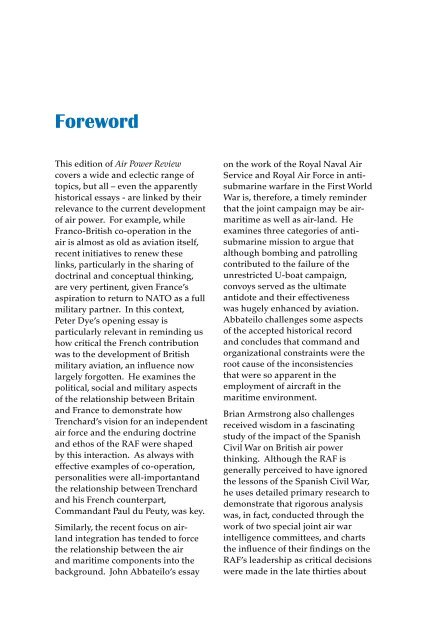You also want an ePaper? Increase the reach of your titles
YUMPU automatically turns print PDFs into web optimized ePapers that Google loves.
Foreword<br />
This edition of <strong>Air</strong> <strong>Power</strong> Review<br />
covers a wide and eclectic range of<br />
topics, but all – even the apparently<br />
historical essays - are linked by their<br />
relevance to the current development<br />
of air power. For example, while<br />
Franco-British co-operation in the<br />
air is almost as old as aviation itself,<br />
recent initiatives to renew these<br />
links, particularly in the sharing of<br />
doctrinal and conceptual thinking,<br />
are very pertinent, given France’s<br />
aspiration to return to NATO as a full<br />
military partner. In this context,<br />
Peter Dye’s opening essay is<br />
particularly relevant in reminding us<br />
how critical the French contribution<br />
was to the development of British<br />
military aviation, an influence now<br />
largely forgotten. He examines the<br />
political, social and military aspects<br />
of the relationship between Britain<br />
and France to demonstrate how<br />
Trenchard’s vision for an independent<br />
air force and the enduring doctrine<br />
and ethos of the RAF were shaped<br />
by this interaction. As always with<br />
effective examples of co-operation,<br />
personalities were all-importantand<br />
the relationship between Trenchard<br />
and his French counterpart,<br />
Commandant Paul du Peuty, was key.<br />
Similarly, the recent focus on airland<br />
integration has tended to force<br />
the relationship between the air<br />
and maritime components into the<br />
background. John Abbateilo’s essay<br />
on the work of the Royal Naval <strong>Air</strong><br />
Service and Royal <strong>Air</strong> Force in antisubmarine<br />
warfare in the First World<br />
War is, therefore, a timely reminder<br />
that the joint campaign may be airmaritime<br />
as well as air-land. He<br />
examines three categories of antisubmarine<br />
mission to argue that<br />
although bombing and patrolling<br />
contributed to the failure of the<br />
unrestricted U-boat campaign,<br />
convoys served as the ultimate<br />
antidote and their effectiveness<br />
was hugely enhanced by aviation.<br />
Abbateilo challenges some aspects<br />
of the accepted historical record<br />
and concludes that command and<br />
organizational constraints were the<br />
root cause of the inconsistencies<br />
that were so apparent in the<br />
employment of aircraft in the<br />
maritime environment.<br />
Brian Armstrong also challenges<br />
received wisdom in a fascinating<br />
study of the impact of the Spanish<br />
Civil War on British air power<br />
thinking. Although the RAF is<br />
generally perceived to have ignored<br />
the lessons of the Spanish Civil War,<br />
he uses detailed primary research to<br />
demonstrate that rigorous analysis<br />
was, in fact, conducted through the<br />
work of two special joint air war<br />
intelligence committees, and charts<br />
the influence of their findings on the<br />
RAF’s leadership as critical decisions<br />
were made in the late thirties about

















